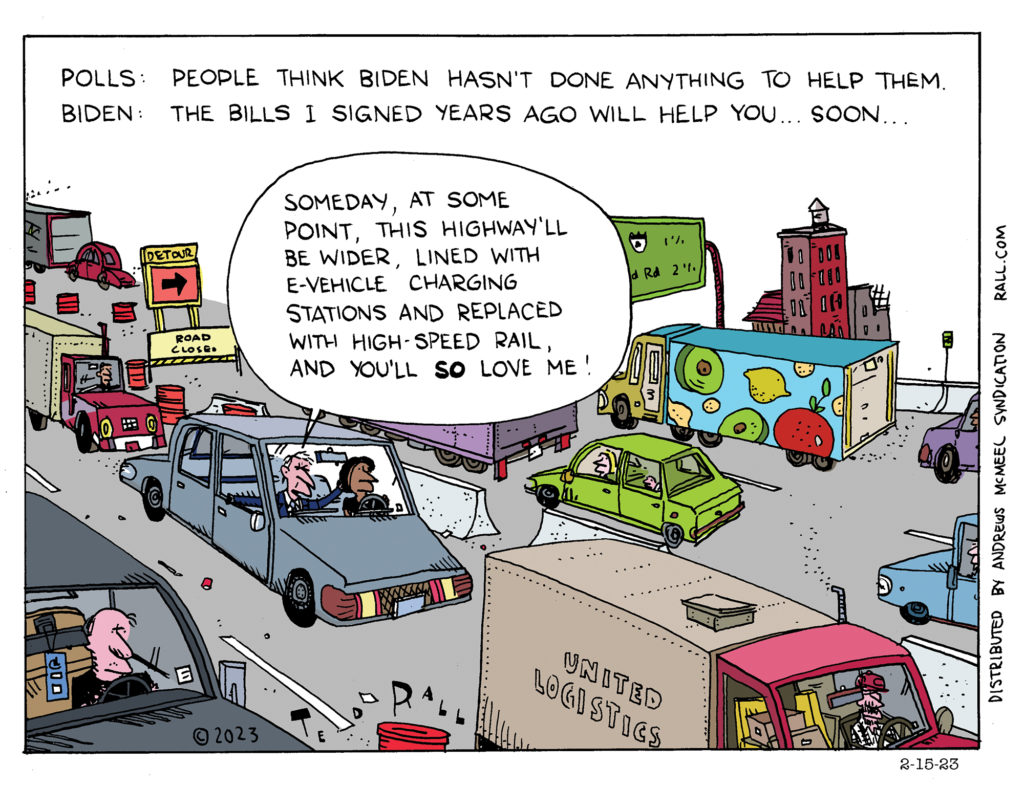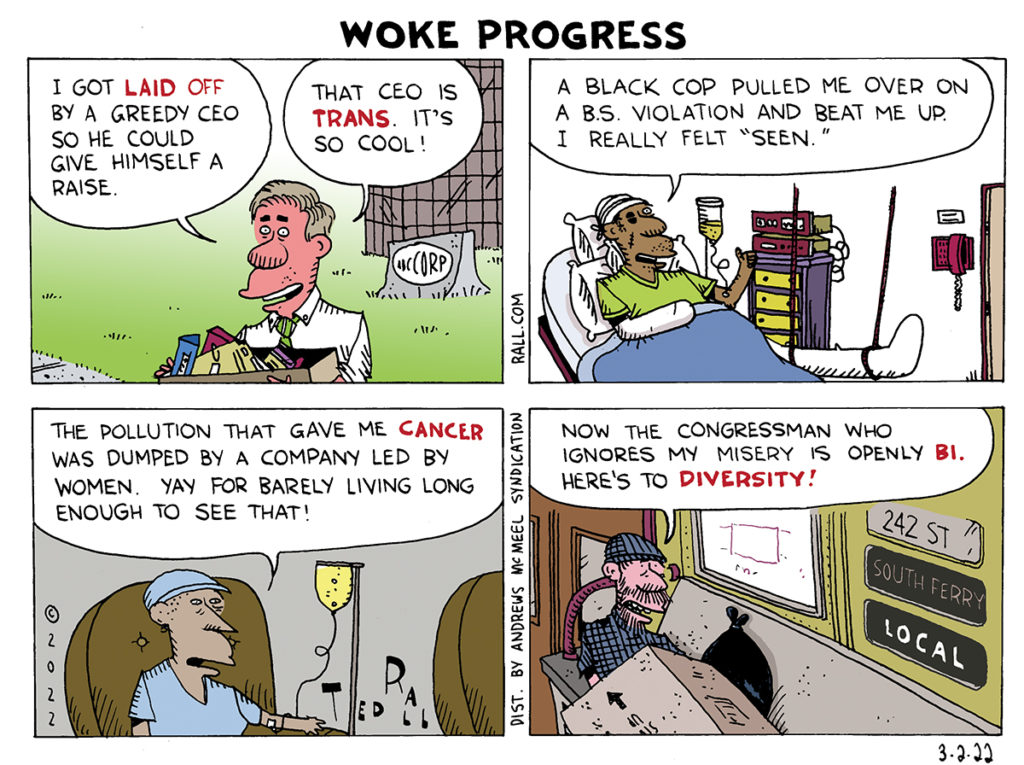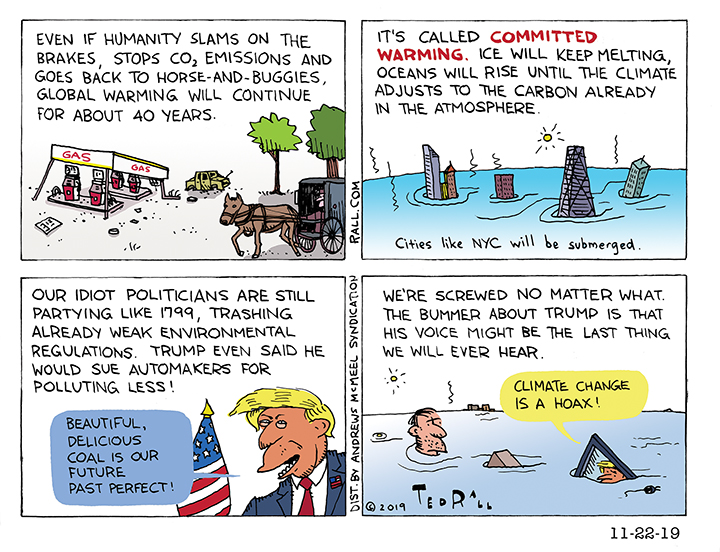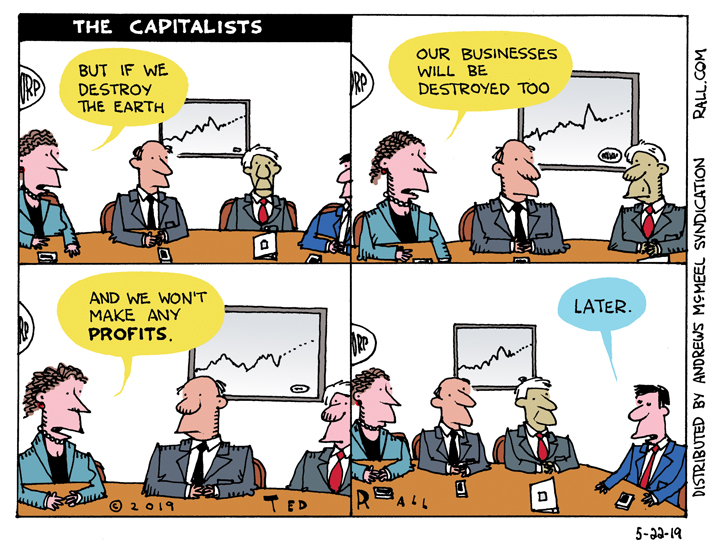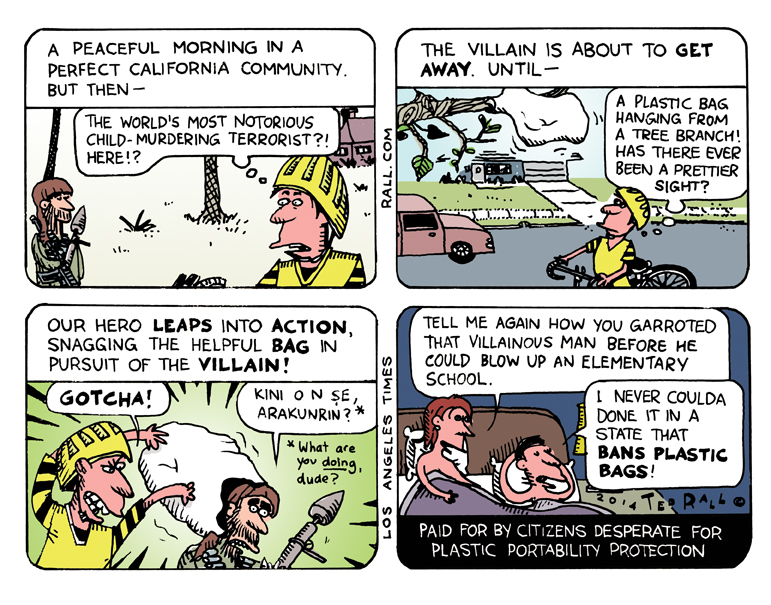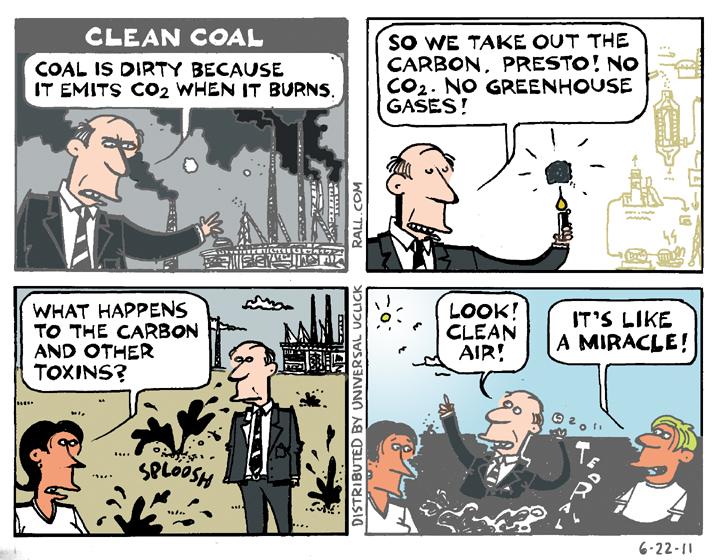President Biden rolled out the likely theme of his possible reelection campaign during his State of the Union address: “Finish the Job.” The slogan, which he repeated several times, argues that the infrastructure and other legislation he signed a year and a half ago, are only just beginning to impact the everyday lives of the American people, who should be patient because good things are on the way. But if good things are on the way anyway, does it really matter whether Democrats or Republicans are in charge by the time they arrive?
Great Replacement
“The great replacement theory” is a conspiracy theory that looks at the shrinking proportion of white Americans and explains it as the result of a left-leaning plot to replace whites with people of color who are more likely to vote to the left. It has gained mainstream currency within the Republican Party and on Fox News.
The Annals of Woke Progress
For identity politics “woke” liberals, symbolic gains in diversity are all that really matter when gauging progress. Rather than focusing on policies that actually improve people’s lives, they promote privileged subsets of historically underprivileged groups. The absurdity and futility of this approach manifests itself when token representatives like Kamala Harris and Hillary Clinton join the ruling classes and become just as oppressive as the traditional old white males.
LOS ANGELES TIMES CARTOON: We’ll Miss Those California Flowers
I draw cartoons for The Los Angeles Times about issues related to California and the Southland (metro Los Angeles).
This week:
It looks to be the end of the plastic grocery bag as we know it.
The state assembly appears to have struck a deal in which Californians would pay at least a dime for each recycled paper or reusable plastic bag they get at the grocery store. The currently-ubiquitous single-use plastic bags that have bedeviled litter-control types and environmentalists would be prohibited. That’s a lot of bags. Californians use an estimated 12 billion single-use plastic bags each year.
Plants that manufacture single-use bags would be retooled into recycling facilities, preventing job losses.
Given how hard opponents of a ban have fought over the years, it seemed wrong to this perverse cartoonist not to consider that something (aside from growing the massive plastic trash island in the Pacific Ocean) may be lost. But what?
Following the lead of dark surrealism master director David Lynch, I drank lots and lots of coffee to get my idea juices flowing. This is what I came up with: the plastic bag as weapon.
In self-defense class, they taught me that a folded newspaper can be a surprisingly potent tool for fending off an assailant. (No word yet on whether an iPad can knock a ruffian unconscious.) So can a trash can. What appeals about these strategies is the fact that they’re ubiquitous. Like — you remember the previous use of that word in this little essay — plastic bags. They’re everywhere, hanging from trees! In Africa, people ironically nickname them “African flowers.” What if a “California flower” could be called into service by law-abiding citizens?
Yep. That’s all I got.
Lynch must have drunk more coffee than me.
SYNDICATED COLUMN: “Captain Phillips” is a Beautiful Lie

“Cinéma Vérité” as Political Propaganda
Paul Greengrass is a gifted director who specializes in historical reenactments, a once marginal genre that in recent years hits the sweet spot, earning critical plaudits as well as bringing in bank (Greengrass’ “United 93,” Stephen Frears’ “The Queen,” Oliver Hirschbiegel’s “Downfall,” about Hitler’s final days in his bunker). Greengrass’ latest entry in this field is “Captain Phillips,” a retelling of the 2009 hijacking of a container ship by Somali pirates. Tom Hanks stars in the title role.
Watching this film left me with an uneasy feeling, like I’d digested a delicious meal devoid of nutrition. It was a fun drama. But I didn’t learn anything. Why not?
This is solid Hollywood filmmaking. Tight scripting, sharp editing and unpretentious cinematography deliver a story that keeps you in your seat long after you began having to pee. Hanks delivers one of his finest performances, driving a stake into his rep as an always-playing-himself actor; Barkhad Abdi is a sensational revelation as pirate leader Abduwali Muse.
But what does this film mean? What message does Greengrass convey to his audience?
In random order, here are the takeaways: leadership is tough. Bravery exacts a high cost. In an interconnected world — we watch Phillips email his wife after the pirates’ first attempt to board the Maersk Alabama — it’s nevertheless possible to be alone, isolated and vulnerable. Intermodal transport, an industry in which vast ships carrying thousands of tons of goods are piloted by an unarmed skeleton crew, is surreal. If nothing else, “Capitain Phillips” is worth watching because it opens a window into the lonely lives of the men and women responsible for keeping our store shelves stocked.
Pull out of the multiplex parking lot, however, and you quickly realize the real revelation: “Phillips” is pro-government propaganda.
Greengrass has created the most frightening kind of propaganda — so effective that for most people it will become the definitive historical account of an event. Unlike the hilariously shrill propaganda flicks of the past, from “Triumph of the Will” to Cold War-era artifacts like “Rambo” and “Red Dawn,” the new breed pretends not to editorialize. Affecting a quiet, Zoloft-inflected tone and economical, apparently straightforward scriptwriting, this movie plays it close to the vest, coming off as deadly fair and serious. Which makes it easy to miss what is left out.
This new cinéma non-vérité uses high art to sanitize history in order to elevate the imperialist, militarist geopolitical agenda of the U.S. government in its post-9/11 war on terror.
Kathryn Bigelow never scratches the surface of Osama bin Laden’s motivations in “Zero Dark Thirty.” He’s just a target, a cipher in a beard, so we don’t care when he dies. Her film is thrilling yet vacuous.
It is far from settled history that United Flight 93 was brought down by the passenger revolt — the 9/11 Commission Report leaves open the possibility that it was shot down. But that would prompt uncomfortable questions. Greengrass’ film, which unquestioningly accepts the “let’s roll” scenario, all but sets it in stone for posterity.
Ben Affleck’s “Argo” is devoid of political context, especially the historical basis for the Iranian revolutionaries’ contempt for the United States. Best not to mention the coup, the shah, corruption or torture.
American movies are about choices. Will the protagonist choose right or wrong (and which is which)? In “Captain Phillips,” however, the ethical quandaries rest not on Hanks’ character, who handles his ordeal as courageously and competently as you could expect, but on Abdi’s shoulders. It’s more than a little odd.
“We are just fisherman,” Abdi explains after seizing control of the vessel. Fortunes reverse after crewmen hidden in the engine room capture him and trade him for their captain, who offers them $30,000 in cash and a lifeboat to leave the ship. Disgusted that the Somalis won’t settle for less than “millions” and physically brutalized, Hanks spits “you are not a fisherman!” at Abdi an hour later into the movie.
It’s a puzzling narrative choice. Not only is Abdi’s a supporting role, we don’t see much deliberation. Muse is in it for the big bucks all along. So are his colleagues.
Passing up the obvious chance to use this mother of all culture clashes as a means to discuss race and class, Greengrass has nevertheless succumbed to the hoary colonial instinct to ask, almost out loud, why $30,000 isn’t enough to sate a gang of starvation-thin guys from one of the world’s poorest countries. The closest we get to an answer is a tossed-off aside by Abdi that the fish “left” Somali waters.
The background, mentioned only obliquely in this movie about Somali piracy, is that Somalia’s fishing industry had been decimated. After Somalia collapsed into the sectarian civil conflict in the early 1990s, the absence of a strong central government — coupled with the indifference of the international community — opened a vacuum for opportunists. Foreign trawlers and other vessels dump industrial waste, toxins and even nuclear waste — including uranium — off the Somali coast. Foreign fishing ships use drift nets to steal the fish that survive.
Time magazine reported in 2009 that Somalis turned to piracy after Western ships made it impossible to fish: “A United Nations report in 2006 said that, in the absence of the country’s at one time serviceable coastguard, Somali waters have become the site of an international ‘free for all,’ with fishing fleets from around the world illegally plundering Somali stocks and freezing out the country’s own rudimentarily-equipped fishermen. According to another U.N. report, an estimated $300 million worth of seafood is stolen from the country’s coastline each year.”
Desperate Somali fishermen formed vigilante flotillas to go after foreign fishing vessels. Some robbed the poachers at gunpoint. This turned out to be much more lucrative than fishing. Piracy became a $50 million a year industry.
If Abduwali Muse isn’t really a fisherman, he didn’t have that option to begin with.
Postscript: Somalis who still try to fish are harassed, questioned and detained by American warships assigned to the Horn of Africa to deter pirates. (In “Captain Phillips,” this Navy practice is whitewashed.)
Two or three additional lines of dialogue would have enlightened American movie audiences about the complexity of the piracy issue. Exposing the antagonists’ motivations would have made “Captain Phillips” a smarter movie, a tragedy in which opposing forces, neither side evil, are forced into a clash in which at least one side must die. Greengrass gives us all the moral nuance of cowboy-versus-Injun movie.
“Capitain Phillips” is the triumph of suburban schlubs and high-tech military hardware over hollow-eyed black men in rags, horribly unfamiliar with basic oral hygiene.
By the way, if some of the Maersk Alabama’s crewmen are to be believed, Phillips was a lousy captain who imperiled them by skirting too close to the Somali coast. Deborah Waters, an attorney representing 11 crewmen who are suing Maersk, said: “He told them he wouldn’t let pirates scare him or force him to sail away from the coast.”
Maybe, maybe not. Only those who were there know for sure.
Making films is also about choice.
When you make a film based on history, it’s impossible to include every detail. Nor should you try.
Still, basic background facts are crucial to understanding the event being depicted. Omitting or spinning issues (why Somalis resorted to piracy) strips them of context. Deploying a matter-of-fact tone makes these cinematic lies (because the Somalis are poor and greedy) credible.
It is unforgivable to promote America’s we’re-the-good-guys party line at the expense of the victims of the system. (Muse, politically voiceless in this film, is serving 33 years in federal prison.) Dressing up a perversion of truth in pretty lighting, and stuffing tainted dialogue into the mouths of great actors, results in an affront to art as well as history.
(Ted Rall’s website is tedrall.com. Go there to join the Ted Rall Subscription Service and receive all of Ted’s cartoons and columns by email.)
COPYRIGHT 2013 TED RALL
SYNDICATED COLUMN: Occupy Main Street
For America’s New Radicals, a Coming-Out Party—and Brutal Cops
“First they ignore you, then they ridicule you, then they fight you, then you win.” —Gandhi
Gandhi lost, but never mind.
#OccupyWallStreet, in its second week as of this writing, is and was important. It is the first major street protest inspired by the economic collapse that began in 2008. It is also the first notable public repudiation of Obama by the American Left. Inspired by the Arab Spring, the Canadian “culture jammer” magazine Adbusters asked people to converge on lower Manhattan’s financial district in order to protest corporate greed in general and—in a reflection of the influence of social networking culture—to develop one specific major demand after they gathered.
Several thousand people arrived 10 days ago but were turned away from Wall Street by a phalanx of NYPD officers manning metal barricades. A few hundred demonstrators, dominated by the scruffy white twentysomething college grads known as “hipsters,” wound up at Zuccotti Park, whose private owners granted them permission to camp there.
There they remain, noshing on donated pizza, talking, hanging out, hoping to replicate the magic of Cairo’s Tahrir Square while remaining committed to “absolute nonviolence in the Gandhian tradition,” as Adbusters commanded.
Occupy Wall Street now seems to be fizzling out.
For me and other older, jaded veterans of leftist struggle, failure was a foregone conclusion. From the opening words of the magazine’s updates to the participants, which it referred to as “dreamers, jammers, rabble-rousers and revolutionaries,” it was evident that yet another opportunity to agitate for real change was being wasted by well-meant wankers.
Michael Moore complained about insufficient media coverage, but this non-movement movement was doomed before it began by its refusal to coalesce around a powerful message, its failure to organize and involve the actual victims of Wall Street’s perfidy (people of color, the poor, the evicted, the unemployed, those sick from pollution, etc.), and its refusal to argue and appeal on behalf of a beleaguered working class against an arrogant, violent and unaccountable ruling elite—in other words, to settle for nothing less than the eradication of capitalism.
Don’t just occupy Wall Street.
Occupy Main Street. Get ordinary people interested and involved. After all, college kid, it’s not just your struggle.
While a lack of political education should not preclude a person from participating in politics, organizers of a movement seeking radical change should make sure they don’t waste the whole time strumming a guitar and flirting. Zuccotti Park should have offered daily classes and study groups to reduce the odds that an attendee will sound like a moron when she gets questioned by a journalist.
“I’m not for interference [with wealthy people],” The New York Times quoted protester Anna Sluka. “I hope this all gets people who have a lot to think: I’m not going to go to Barcelona for three weeks. I’m going to sponsor a small town in need.” Earth to Anna: Rich people know poor people are suffering. They don’t care.
Also, lose the clown clothes. It’s not the early 1960s; you don’t have to wear a suit like the civil rights marchers did. But how about showing up on national TV looking decent, like it’s Casual Friday?
Revolutionaries should not expect fair coverage by media outlets owned by the transnational corporations they hope to overthrow. They also shouldn’t make themselves so easy to mock. Press accounts reveled in photos of topless women and the dudes on stilts who always show up at these things. So much bad hair, so many colors that don’t occur in nature.
A protest is a stage. All over New York City and around the country, people are watching on TV. Ideally, you want viewers to drop what they’re doing, to come join you. At bare minimum, you want them to approve of you. To identify with you. Maybe even send a check.
You say you represent the “99 percent” of Americans getting screwed by the top one percent. So act like the 99 percent. Dress like them.
Be normal, inclusive and welcoming.
Reporters quoted demonstrators who sounded as ignorant about current affairs as members of the Tea Party, albeit nicer. It was a perfect set-up for hit pieces by the likes of Ginia Bellafante, who called the downtown gathering an “opportunity to air societal grievances as carnival” and slammed the “group’s lack of cohesion and its apparent wish to pantomime progressivism rather than practice it knowledgably.”
History has proven that an absolute commitment to nonviolence can never effect radical change. This was shown again on Saturday September 23rd, when police used orange plastic nets to “kettle” and arrest about 80 Occupy Wall Streeters who had been marching peacefully through Greenwich Village. According to numerous witnesses and media accounts, none resisted. Cops went wild, beating several men bloody and macing at least one woman after she had been cuffed.
Sadly, too many people angry at gangster capitalists will look at the YouTube videos of bloodied young faces and say to themselves: I’m willing to suffer for a cause, not a scene.
Back in July, Adbusters wanted the “one simple demand” expressed by Occupy Wall Street to be “that Barack Obama ordain a Presidential Commission tasked with ending the influence money has over our representatives in Washington.”
What do we want?
A bipartisan blue-ribbon commission to study the extension of campaign finance reform!
When do we want it?
As soon as the committee completes its work!
Unsurprisingly and rightly, that uninspiring (and easily satisfied) demand has been set aside in favor of something better but hardly worth taking a rubber bullet for: “a vague but certain notion that the richest percentile of the country remains fat and happy as the going-on-five-year-old recession continues to batter the middle and working class,” as The New York Observer put it.
Occupy Wall Street should have demanded something majestic, reasonable and unobtainable, in order to expose the brutal nature of the system. Something like the nationalization of all corporations, equal wages for all workers, or the abolition of securities exchanges.
Some organizers also called Occupy Wall Street “Days of Rage”; along with organization and focus, rage is what is lacking.
The aggregated wealth of the superrich has been stolen from the rest of us. We should not ask them to give some of it back. We should take it all, then jail them.
Which isn’t going to happen nonviolently.
Rich people are bad people. Someone has to say it out loud.
I have no problems with the organizers of a protest deciding that its marchers will remain nonviolent. I am speaking at such an event on October 6th. However, I think it’s unwise to broadcast those intentions to the authorities.
Few people think about it now, but street demonstrations have always relied on a sense of menace. Sure, people marching through the streets of a medieval city might begin by expressing their demands peacefully. But they drank beer instead of water. On a hot day, things might escalate into a riot. The local lord was wise to give in earlier rather than later.
The rich and powerful never relinquish their prerogatives voluntarily. Only violence or the credible threat of violence can force them to give up what they stole through violence and corruption.
Despite the protesters’ many missteps, which were inevitable due to their lack of experience and political seasoning, the Occupy Wall Streeters should be commended. Sure, they did some stupid things. But they have taken a first (tentative) step into history. They have learned lessons. Hopefully they will be smarter next time.
See you in Washington on October 6th, when the October 2011 Coalition will begin the occupation of Freedom Square near the White House. Our demand is simple: We will not leave until the last occupation soldier and mercenary is withdrawn from U.S.-occupied Afghanistan.
(Ted Rall is the author of “The Anti-American Manifesto.” His website is tedrall.com.)
COPYRIGHT 2011 TED RALL

